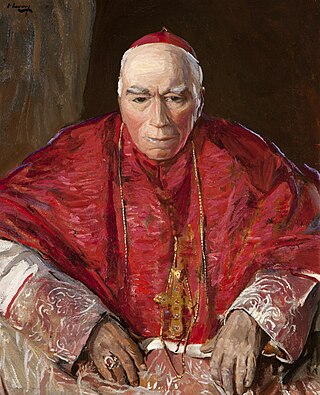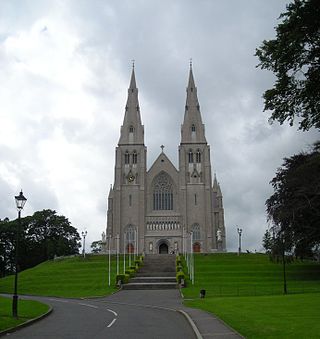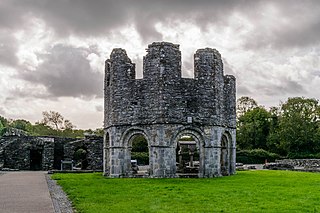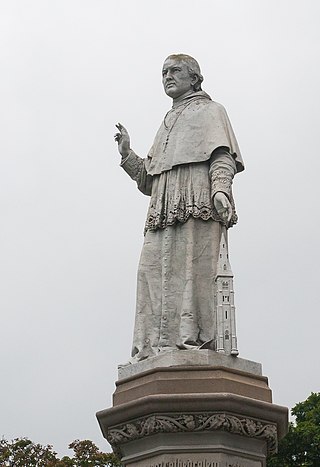
Pope Innocent IV, born Sinibaldo Fieschi, was head of the Catholic Church and ruler of the Papal States from 25 June 1243 to his death in 1254.
The Primacy of Ireland refers to the office of the highest Catholic authority in the island of Ireland. Primate is a title of honour denoting ceremonial precedence in the Church, and in the Middle Ages there was an intense rivalry between the Archbishop of Armagh and the Archbishop of Dublin as to seniority. The dispute between the two archbishoprics was finally settled by Pope Innocent VI. Since 1353 the Archbishop of Armagh has been titled Primate of All Ireland and the Archbishop of Dublin Primate of Ireland, signifying that they are the senior churchmen on the island of Ireland, the Primate of All Ireland being the more senior. The titles are used by both the Catholic and Church of Ireland bishops. The distinction mirrors that in the Church of England between the Primate of All England, the Archbishop of Canterbury, and the Primate of England, the Archbishop of York.

Malachy is an Irish saint who was Archbishop of Armagh, to whom were attributed several miracles and an alleged vision of 112 popes later attributed to the apocryphal Prophecy of the Popes.

Albert Suerbeer was the first Archbishop of Riga in Livonia.

Michael Cardinal Logue was an Irish prelate of the Catholic Church. He served as Archbishop of Armagh and Primate of All Ireland from 1887 until his death in 1924. He was created a cardinal in 1893.

William John Cardinal Conway was an Irish cardinal of the Roman Catholic Church who served as Archbishop of Armagh and Primate of All Ireland from 1963 until his death, and was elevated to the cardinalate in 1965. He was head of the Catholic Church in Ireland during the reforms of the Second Vatican Council.

John of Wildeshausen, O.P., also called Johannes Teutonicus was a German Dominican friar, who was made bishop of Bosnia and later the fourth master general of the Dominican Order.

The Archdiocese of Armagh is a Latin ecclesiastical territory or archdiocese of the Catholic Church located in the northern part of Ireland. The ordinary is the Roman Catholic Archbishop of Armagh who is also the Metropolitan of the Ecclesiastical province of Armagh and the Primate of All Ireland. The mother church is St Patrick's Cathedral. The claim of the archdiocese to pre-eminence in Ireland as the primatial see rests upon its traditional establishment by Saint Patrick circa 445. It was recognised as a metropolitan province in 1152 by the Synod of Kells.

The Synod of Kells took place in 1152, under the presidency of Giovanni Cardinal Paparoni, and continued the process begun at the Synod of Ráth Breasail (1111) of reforming the Irish church. The sessions were divided between the abbeys of Kells and Mellifont, and in later times the synod has been called the Synod of Kells-Mellifont and the Synod of Mellifont-Kells.

Stephen (I) Báncsa was the first Hungarian cardinal of the Roman Catholic Church. Prior to that, he served as Bishop of Vác from 1240 or 1241 to 1243, then Archbishop of Esztergom from 1242 until his creation as cardinal.
The Archbishop of Dublin is the head of the Archdiocese of Dublin in the Catholic Church, responsible for its spiritual and administrative needs. The office has existed since 1152, in succession to a regular bishopric since 1028. The archdiocese is the metropolitan see of the ecclesiastical province of Dublin, and the archbishop is also styled the Primate of Ireland. The cathedral church of the archdiocese is Saint Mary's Pro-Cathedral in Dublin city, although the Church formally claims Christ Church as its cathedra, and the archbishop's residence is Archbishop's House in Drumcondra.

Daniel McGettigan (1815–1887) was an Irish prelate of the Roman Catholic Church. He served Bishop of Raphoe from 1861 to 1870 and Archbishop of Armagh from 1870 to 1887.

The Archdiocese of Nidaros was the metropolitan see covering Norway in the later Middle Ages. The see was the Nidaros Cathedral, in the city of Nidaros. The archdiocese existed from the middle of the twelfth century until the Protestant Reformation.
Dominic Maguire O.P. was an Irish prelate of the Roman Catholic Church. A leading Jacobite in Ireland, he served as the Archbishop of Armagh and Primate of All Ireland from 1683 to 1707.
Cormac Mác Shamhradháin O.S.A., b. c.1410-d.1476, was the Roman Catholic Bishop of Ardagh diocese in Ireland from 1444 to 1476.

Edmund MacGauran was the Roman Catholic Archbishop of Armagh, Ireland from 1587 to 1593 and Bishop of Ardagh from 1581 to 1587.

Eamon Columba Martin KC*HS is an Irish Catholic prelate from Northern Ireland who has served as Archbishop of Armagh and Primate of All Ireland since 2014.
Saint Ségéne was the Bishop of Armagh, Ireland from 661 to 24 May 688.
Luke Netterville was an Anglo-Norman churchman in Ireland, archbishop of Armagh from 1218.

Thomas of Capua, also called Tommaso di Eboli, was an Italian prelate and diplomat. He served as the archbishop-elect of Naples from 1215 until 1216 and then as a cardinal until his death. He administered the diocese of Albano between 1218 and 1222 and was the papal legate in the kingdom of Italy from November 1236 until October 1237. He was the most important of Pope Gregory IX's negotiators with the Emperor Frederick II between 1227 and 1237.












